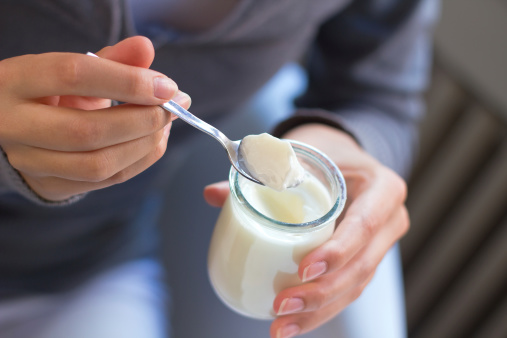 If you walk through a grocery store, I guarantee you’ll find a multitude of strategically-placed food packages with large labels claiming, “Packed with probiotics!” or “10x the Probiotics!”
If you walk through a grocery store, I guarantee you’ll find a multitude of strategically-placed food packages with large labels claiming, “Packed with probiotics!” or “10x the Probiotics!”
Over the past few years, food companies have jumped on the probiotics bandwagon, ever since people began to discover just how good they are for you, particularly for your digestive system.
Are Probiotics Bacteria?
Yes, but good bacteria! Probiotics are “live microorganisms”—bacteria and yeasts that bring a multitude of health benefits to the gastrointestinal tract when consumed in proper doses.
Benefits include treating diarrhea, inhibiting duodenal ulcers, reducing symptoms of lactose intolerance, and reducing intestinal pain. For people with celiac disease, this is very good news.
What Are the Causes and Symptoms of Celiac Disease?
Recent studies have shown that in the U.S., approximately two million Americans, or one in every 133 people, have celiac disease. This disease is an inherited autoimmune disorder that damages the small intestine when gluten is present in the diet. Gluten is mostly found in protein such as wheat, rye, and barley.
The damage that is done to the intestinal lining from celiac disease makes the gut more vulnerable and less protective to the environment—it can even disrupt the gut’s ability to gather and filter nutrients that pass through it. This can allow certain bacteria and other toxins, along with undigested proteins and fats, to leak from the intestine into the bloodstream. When this occurs, it triggers additional immune responses, which will make the symptoms worse.
The symptoms from celiac disease can fluctuate from person to person, but they generally include abdominal pain, chronic diarrhea, foul smelling stool, fatty or discolored stool, weight loss, bone pain, and fatigue. For infants, symptoms can include delayed growth and failure to thrive.
Did you know that celiac disease runs in the family? You’ll have a 10 % higher chance of being diagnosed with celiac disease if someone else in your family has it. The disease can also often be triggered by constant physical stress from surgery, pregnancy, childbirth, and viral infections.
How Can Probiotics Help with Celiac Disease?
If you have been diagnosed with celiac disease and it has fully developed, you should already be following a gluten-free diet. However, researchers may have found another promising strategy that can cause celiac disease to regress—adding probiotics to your diet.
In a study published in the journal Laboratory Investigation, researchers conducted a test on mice with celiac disease. The researchers revealed that when the mice were fed the probiotic Saccharomyces boulardii KK1, the changes associated with celiac disease progression started to reverse.
The probiotics that are consumed may actually help heal the intestinal barrier that has been damaged by the disease, and it can also alleviate the severity of the condition by influencing the inflammation.
What Are the Best Sources of Probiotics for Celiac Disease?
You may be thinking, “I’ll start taking probiotics today so I can feel better for my party next week.” If you are expecting a fast transition when taking probiotics for celiac disease, you are unfortunately in for a disappointment. When probiotics are taken, it usually takes anywhere from four to six months to see the full benefits.
The following probiotics strains can be used and may benefit those with celiac disease:
1. Lactobacillus Acidophilus: This probiotic occurs naturally in human and animal gastrointestinal tracts, as well as in dairy products. The DDS-1 strain of L. acidophilus is known as one of the world’s best characterized probiotics. Medically, it contains a production of lactic acid-supporting good bacteria in the gut. It also produces vitamins B and K, prevents colon cancer, treats diarrhea, inhibits duodenal ulcers, reduces symptoms of lactose intolerance, and reduces intestinal pain.
2. Lactobacillus Casei: Part of the above probiotic, it is found in the human intestine and mouth. It produces lactic acids, which assist with the spreading of positive bacteria in the gut, fermentation of lactose, and helps people with lactose intolerance as well.
3. Lactobacillus Salivarius: It produces lactic acid and supports positive bacteria in the gut. It reduces the inflammatory process that causes colitis and inflammatory arthritis; it also helps to prevent colon cancer.
4. Bifidobacterium Lactis: This is bacterium that is found in the large intestine of the human body. It produces hydrogen peroxide-killing pathogenic bacteria. It also produces vitamins B and K, as well as folic acids. Like many probiotics, it helps to prevents colon cancer.
5. Lactobacillus Lactis: Another bacterium that is used when producing buttermilk and cheese. It produces positive, lactic acid-supporting bacteria in the gut. It also helps to prevent colon cancer and reduces symptoms of lactose intolerance.
Further Benefits of Probiotics on Celiac Disease
Below are five more benefits that probiotics can have on celiac disease and other intestinal issues:
- Prevents upper respiratory and urogenital infections
- Promotes normal intestine contractions and stool consistency
- Prevents and treats antibiotic-associated diarrhea
- Reduces local and systemic inflammatory responses
- Prevents autoimmune and allergic reactions
Finally, it is a good idea to do some research and find out if there is a history of celiac disease in the family—this will be beneficial when your doctor is diagnosing your symptoms.
See More :
- Prebiotics vs. Probiotics; Is One Better Than the Other?
- The Probiotic-Osteoporosis Link Explained
- A Special Drink That Boosts Seniors’ Immunity
Sources:
Shikhman, A. R., “Role of Priobiotics in Improving Gut Health in Celiac Disease,” Celiac.com, April 9, 2014;
http://www.celiac.com/articles/23617/1/Role-of-Probiotics-in-Improving-Gut-Health-in-Celiac-Disease/Page1.html.
Weil, A., “Celiac Disease,” Dr.Weil.com; http://www.drweil.com/drw/u/ART02955/Celiac-Disease.html, last accessed May 8, 2015.
